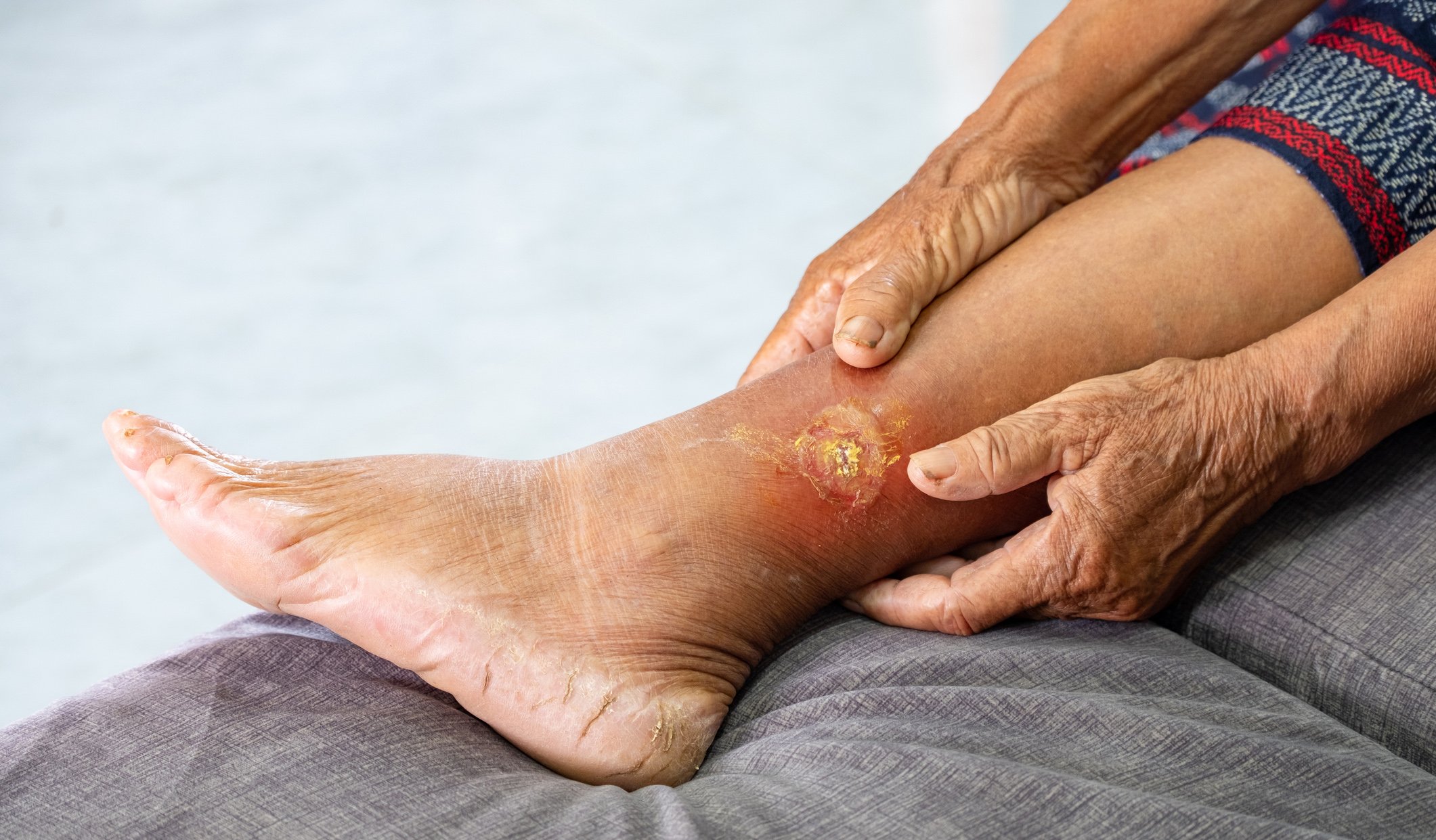Comorbidities may already be present at the initial manifestation of plaque psoriasis, but sometimes these only develop later in the course of the disease. Taking this into account appropriately can help to reduce the disease burden. Disease-modifying therapies, particularly biologics, target systemic inflammation and also have promising potential with regard to comorbidities.
It is increasingly being recognized that inflammation in the context of psoriasis is not limited to the skin, but also leads to systemic inflammatory effects. The hypothesis that common inflammatory pathways and shared genetic vulnerabilities underlie psoriasis and common comorbidities has been confirmed in studies [1].
Genetics, inflammatory pathways and lifestyle factors
Secondary analyses by Armstrong et al. show that psoriasis patients have an increased risk of hypertension and diabetes mellitus, which indicates a systemic component [2,3]. In addition, a meta-analysis by Qiao et al. found a significant association between psoriasis and metabolic syndrome, highlighting that chronic inflammation can promote several comorbid conditions [4]. Genetic studies by Hebert et al. found that psoriasis and inflammatory bowel disease share a common genetic predisposition [5]. A meta-analysis by Patrick et al., which included 11,024 cases of psoriasis and 60,801 cases of coronary heart disease as well as the corresponding controls, identified one different and three common genetic loci for psoriasis and coronary heart disease (CHD). Of note, many of the genes shared by CHD and psoriasis are associated with systemic inflammation, such as NFKB1, TNF and interleukin (IL)-17 [6]. In addition, it is known that certain behavioral factors that affect the immune system (e.g. high body mass index, infections, stress, medication) can trigger psoriasis if there is a corresponding genetic vulnerability [1]. One third of psoriasis sufferers are overweight (BMI ≥30 kg/m²) [30]. Budu-Aggrey et al. konnten unter Anwendung der Mendelian-Randomization-Methode einen kausalen Zusammenhang zwischen BMI und einem erhöhten Psoriasis-Risiko nachweisen [31].
Effects on quality of life, morbidity and mortality
Comorbidities can significantly affect psoriasis patients over the course of their lives and lead to increased morbidity and mortality [1]. Psychological factors (e.g. reduced self-esteem, social stigmatization) also contribute to the development of anxiety, depressive disorders and suicidal tendencies [7]. In a population-based cohort study in the UK, 10,400 diagnoses of depression, 7,100 diagnoses of anxiety and 350 diagnoses of suicidality were attributed to psoriasis each year [8]. Fortunately, recent findings have also shown that these risks can be counteracted by adequate therapeutic measures. It appears that treatment with biologics is able to reduce the frequency and risk of depression and sleep disorders to a greater extent than conventional treatment options [9–11]. In summary, effective and tolerable psoriasis therapy can improve both the physical and psychological aspects and ultimately reduce the overall burden on patients and contribute to a better quality of life.
| The concept of the “Psoriatic March” |
| As early as 2011, Boehncke et al. described the “psoriatic march” as an explanatory model for cardiovascular comorbidities in severe psoriasis. The basic idea of the is that the increased inflammatory burden leads to insulin resistance, which causes endothelial dysfunction and subsequently favors the occurrence of atherosclerosis and major adverse cardiovascular events (MACEs) [25]. |
| It has been observed that C-reactive protein (CRP) and other biomarkers of inflammation as well as indicators of platelet activation (e.g. P-selectin) are elevated in the blood of psoriatic patients [26–28]. In addition, visceral adipocytes are a source of proinflammatory mediators, highlighting the role of obesity as an exacerbating factor for systemic inflammation**. The proinflammatory cytokines and adipokines may subsequently promote insulin resistance, which has been shown to cause endothelial dysfunction$ (Fig. 1) [29]. |
| ** vascular endothelial growth factor and adipokines (e.g. insulin antagonists resistin and leptin); $ for example through activation of the proatherogenic mitogen-activated protein kinase (MAPK) signaling pathway in endothelial cells or through induction of nitric oxide (NO)-dependent vasodilation |
| to [24] |
Biologics for psoriatic arthritis and cardiometabolic comorbidities
Several studies have shown how effective systemic therapies with biologics can improve the symptoms of psoriatic arthritis (PsA) and inhibit radiographic progression [12–14]. However, this does not apply equally to all PsA patients, as other studies have shown [15–17]. However, those who did not experience a reduction in the progression of radiologically detectable structural joint damage during biologics treatment reported a reduction in pain and an improvement in physical function.
Biologics can not only mitigate skin and joint involvement, but also have cardiovascular benefits according to some studies. There is evidence that biologics can halt the progression of CHD, restore myocardial dysfunction, improve endothelial function and reduce the number of serious cardiovascular events (myocardial infarction, stroke or transient ischemic attack, unstable angina) [18–21]. Wu et al. conducted a retrospective cohort study in which they compared 13,935 psoriasis patients who were treated with TNF-alpha inhibitors with those who received methotrexate and found that fewer cardiovascular events (myocardial infarction, stroke or transient ischemic attack, unstable angina) occurred in those treated with TNF-alpha inhibitors [21].
However, there are still many unanswered questions regarding the possible effects of biologics on cardiovascular risks and the findings are controversial. Rungapiromnan et al. conducted a prospective cohort study involving 5468 biologics-naïve patients treated with adalimumab, etanercept or ustekinumab and 2189 patients receiving methotrexate. However, they found no statistically significant difference in the risk of major cardiovascular events between the two groups [22]. Similarly, Bissonnette et al. using data from the Psoriasis Longitudinal Assessment Registry (PSOLAR), found no reduction in major adverse cardiovascular events (MACE; myocardial infarction, stroke or cardiovascular death) in psoriasis patients receiving biologics compared to those undergoing topical therapy or phototherapy [23].
In summary, it can be stated that a multidisciplinary, individualized approach is best suited to ensure optimal care for patients with psoriasis and any comorbidities and to monitor risk constellations.
Literature:
- “Treating Inflammation Benefits Psoriasis and its Comorbidities”, Allison Truong, MD, FAAD, July 30, 2024, https://psoriasiscouncil.org/expert-insights/treating-inflammation (last accessed August 12, 2024).
- Armstrong AW, Harskamp CT, Armstrong EJ: The association between psoriasis and hypertension: a systematic review and meta-analysis of observational studies. J Hypertens 2013; 31(3):433–442; discussion 442–443.
- Armstrong AW, Harskamp CT, Armstrong EJ: Psoriasis and the risk of diabetes mellitus: a systematic review and meta-analysis. JAMA Dermatol 2013; 149(1): 84–91.
- Qiao J, Jia QN, Jin HZ: Association between metabolic syndrome and psoriasis: a meta-analysis of observational studies with non-psoriasis control groups. Arch Med Sci 2020; 17(6): 1558–1565.
- Hébert HL, et al.: Genetic susceptibility to psoriasis and psoriatic arthritis: implications for therapy. Br J Dermatol 2012; 166(3): 474–482.
- Patrick MT, et al.: Shared genetic risk factors and causal association between psoriasis and coronary artery disease. Nat Commun. 2022;13(1):6565. Published 2022 Nov 2. doi:10.1038/s41467-022-34323-4
- Van Voorhees AS, Fried R: Depression and quality of life in psoriasis. Postgrad Med 2009; 121(4): 154–161.
- Kurd SK, et al.: The risk of depression, anxiety, and suicidality in patients with psoriasis: a population-based cohort study. Arch Dermatol 2010; 146(8): 891–895.
- Strober B, et al.: Association Between Biologic Exposure and the Risk of Depression in Patients with Psoriasis: A Retrospective Analysis of Large US Administrative Claims Data. Am J Clin Dermatol, Published online June 27, 2024. doi:10.1007/s40257-024-00877-w.
- Strober B, et al.: Depressive symptoms, depression, and the effect of biologic therapy among patients in Psoriasis Longitudinal Assessment and Registry (PSOLAR). JAAD 2018; 78(1): 70–80.
- Wu CY, et al.: Depression and insomnia in patients with psoriasis and psoriatic arthritis taking tumor necrosis factor antagonists. Medicine (Baltimore) 2016; 95(22): e3816. doi:10.1097/MD.0000000000003816.
- Mease PJ, et al.: Adalimumab for long-term treatment of psoriatic arthritis: 2-year data from the Adalimumab Effectiveness in Psoriatic Arthritis Trial (ADEPT). Ann Rheum Dis 2009; 68(5): 702–709.
- Mease P, et al.: Secukinumab improves active psoriatic arthritis symptoms and inhibits radiographic progression: primary results from the randomised, double-blind, phase III FUTURE 5 study. Ann Rheum Dis 2018;77(6): 890–897.
- Gottlieb AB, et al: Low rates of radiographic progression associated with clinical efficacy following up to 2 years of treatment with guselkumab: results from a phase 3, randomized, double-blind, placebo-controlled study of biologic-naïve patients with active psoriatic arthritis. RMD Open 2023; 9(1): e002789.
- Mease PJ, et al.: Adalimumab effectiveness in psoriatic arthritis trial study group. Adalimumab for the treatment of patients with moderately to severely active psoriatic arthritis: results of a double-blind, randomized, placebo-controlled trial. Arthritis Rheum 2005; 52(10): 3279–3289.
- Zhang KL, Hou SY, Wu D: Efficacy and safety of secukinumab in patients with psoriatic arthritis: A meta-analysis of different dosing regimens. Clinics (Sao Paulo) 2021 Oct 1;76: e2820. doi: 10.6061/clinics/2021/e2820
- Deodhar A, et al.; DISCOVER-1 Study Group. Guselkumab in patients with active psoriatic arthritis who were biologic-naive or had previously received TNFα inhibitor treatment (DISCOVER-1): a double-blind, randomised, placebo-controlled phase 3 trial. Lancet 2020; 395(10230): 1115–1125. Erratum in: Lancet. 2020 Apr 4; 395(10230): 1114.
- Hjuler KF, et al.: Association between changes in coronary artery disease progression and treatment with biologic agents for severe psoriasis [published correction appears in JAMA Dermatol. 2016 Oct 1; 152(10): 1173–1174. doi: 10.1001/jamadermatol.2016.3933]. JAMA Dermatol. 2016;152(10): 1114–1121.
- Ahlehoff O, et al.: Myocardial function and effects of biologic therapy in patients with severe psoriasis: a prospective echocardiographic study. JEADV 2016;30(5): 819–823.
- von Stebut E, et al.: Impact of secukinumab on endothelial dysfunction and other cardiovascular disease parameters in psoriasis patients over 52 Weeks. J Invest Dermatol 2019; 139(5): 1054–1062.
- Wu JJ, et al.: Cardiovascular event risk assessment in psoriasis patients treated with tumor necrosis factor-α inhibitors versus methotrexate. JAAD 2017; 76(1): 81–90.
- Rungapiromnan W, et al.: Risk of major cardiovascular events in patients with psoriasis receiving biologic therapies: a prospective cohort study. JEADV 2020; 34(4): 769–778.
- Bissonnette R, et al.: Evaluation of risk of major adverse cardiovascular events with biologic therapy in patients with psoriasis. J Drugs Dermatol 2017; 16(10): 1002–1013.
- Tsiogka A, et al.: The Impact of Treatment with IL-17/IL-23 Inhibitors on Subclinical Atherosclerosis in Patients with Plaque Psoriasis and/or Psoriatic Arthritis: A Systematic Review. Biomedicines 2023, 11, 318. www.mdpi.com/2227-9059/11/2/318#, (last accessed 12.08.2024)
- Boehncke W-H, et al. The «psoriatic march»: A concept of how severe psoriasis may drive cardiovascular comorbidity. Exp Dermatol 2011; 20: 303–307.
- Campanati A, et al.: Serum levels of adipocytokines in psoriasis patients receiving tumor necrosis factor-α inhibitors: Results of a retrospective analysis. Int J Dermatol 2015; 54: 839–845.
- Shahidi-Dadras M, et al.: Correlation between vascular endothelial growth factor and subclinical atherosclerosis in patients with psoriasis. Int J Dermatol 2016; 55: 52–59.
- Saleh HMA, et al.: Platelet activation: A link between psoriasis per se and subclinical atherosclerosis – A case-control study. Br J Dermatol 2013; 169, 68–75.
- Kim JA, et al.: Reciprocal relationships between insulin resistance and endothelial dysfunction: Molecular and pathophysiological mechanisms. Circulation 2006; 113: 1888–1904.
- Pavlova NT, et al.: Psychosocial aspects of obesity in adults with psoriasis: A systematic review. Skin Health Dis 2021 May 3;1(2):e33. doi: 10.1002/ski2.33.
- Budu-Aggrey A, et al.: Evidence of a causal relationship between body mass index and psoriasis: A mendelian randomization study. PLoS Med 2019 Jan 31; 16(1): e1002739.
DERMATOLOGIE PRAXIS 2024; 34(4): 30–32












